THIS BODY’S LONG AND I’M STILL LOADING
from director Nadia Bedzhanova on Vimeo.
“This body’s long (& I’m still loading)” is a poem from the Internet is for real … order the paperback from C&R Press, SPD, Amazon, or Barnes & Noble, or get a hand-numbered and autographed tête-bêche bound edition at C&R Press
the Internet is for real inverts the autobiography in the age of dis-integration, calling into question all narratives of national belonging.
“Right? So that the universe could eat me & send traces everywhere, this book or the backroom countertop audio of the same scene.”
Sifting through—and re-writing—the films of Godard, the novels of Henry James, Twin Peaks, VR fantasies, Internet ephemera, and his father’s dreams of Cuba, Chris Campanioni reveals the materiality of our spaceless encounters, and forces us to reckon with the violence hidden below the sleek 4G surface. As he revisits his parents’ migration to the United States and his own first-generation dislocation through a blur of poetry, prose, and screen-play, Campanioni shows us that in a culture of self-dissemination and unlimited arrivals, we are all exiles under the sign of a mythical return.
“the Internet is for real is like no other book you’ll read this year. Border-busting, fearless, and exquisitely alive, Campanioni’s latest work thrusts readers into a world of self-projections and bold intimacy, techno-anxieties and cyber-bliss, political whirlwinds and cultural homecomings. the Internet is for real again proves that Chris Campanioni is his own remarkable genre. This is a must-read for the ‘post-Internet’ age and beyond.”
— Jennifer Maritza McCauley, author of Scar On/Scar Off
“the Internet is for real is obsessive, it’s compulsive—it throbs with the autonomic flush of being ‘seen,’ and the reflective terror of being ‘known.’ It scared me the way open water scares me, or outer space the vacuum of black. You read this book, and the book reads you right back.”
— Tommy Pico, author of Junk
“Campanioni’s presence and force of character have an immediate impact. In spite or maybe because of that, the Internet is for real, as an in-depth, challenging composition, may not satisfy the consumer of mass-market or pulp writing, or even a reader expecting traditional poetry, or the form and generic markers of the ‘poetry collection.’ … Campanioni shows himself to be a major intellectual force—an analyst and critic of the human condition in the midst of technological forces—their causes and consequences, costs and benefits.”
— Fence Digital
“In form, thoroughly hybrid—part philosophical essay, part personal narrative, part stream-of-consciousness observation, occasionally epistolary or dialogic, and more often in block form than lineated … Campanioni both questions and enacts what it feels like to live in a radically destabilized world, in which culture, truth and meaning are fragmented, erratic, multiple and permeable.” — RHINO
“Critical theory collides with popular culture, technology, and personal narrative … a wonderful collage-like quality in its language, as well as in its form … the page becomes a visual field.”
— Kenyon Review
“The book embeds itself within, rewrites, and converses with a whole web of cultural artifacts, including Godard’s films, Twin Peaks, and Henry James’s novels. It seems to me that this heightened referentiality is one indicator of a new kind of Post-Internet poetics in which our ideas, more than ever, resist singularity and confinement, are constantly seeking to propagate outwards in associative chains or networks.” — The Adroit Journal
“the Internet is for real translates Gertrude Stein, Henry James, Twin Peaks, the films of Jean Godard, and everything in between, becoming an autobiography in and of assemblage.” — Technoculture
“Campanioni provides voice for those in the United States who wish to convey what it is like to be born of and yet not belong completely to different ethnic groups and nationalities, those who live with an ever-elusive sense of home and belonging. … Campanioni also tackles the nationalistic discourse in the media of recent years that asserts a more singular narrative of American identity. ” — Green Mountains Review
“Chris Campanioni’s the Internet is for real … invoke[s] recurring imagistic motifs as structural devices, the end result being a narrative arc that is not easily charted by familiar literary conventions … expanding what is possible within the artistic repertoire of fiction, carving a space for lyricism, ambiguity, and experimentation within the familiar act of storytelling.” — The Brooklyn Rail
“Campanioni’s the Internet is for real is a threshold book. It stands at the intersection of conflicting classifications of style and genre … what Julia Kristeva calls ‘destructive genesis,’ the process by which a text responds to the corpus of texts that came before it, affirming its origin while going a step further than the canon and claiming a new poetic honesty. … There is a moral dimension to his writing, a recognition and care for the other present in the acknowledgement and love of the self.” — Harvard Review
“… a much-needed treatise on ‘post-Internet’ culture … building several questions about authenticity, writerly performance, the erotics of catalogues, and nostalgia.” — Hobart
“The whole experience of reading the Internet is for real feels like stepping inside a mixed-media collage or Cubism portrait and feeling your way through the various layers, lines, and colors.” — Bending Genres
“Rather than designating the poetic space a realm untouched by the junk-text of social media, spam email, memes and other algorithmic ephemera, Chris embraces such material, as both Warholian gesture and way of exploring what the poetic means in our age when received notions of humanity are intermingling with artificial intelligence.” — Tupelo Quarterly
“… a mammoth volume of hybrid works. Part Oxford Reference, Pinterest board, and self-surveillance aboard the F, his poems fly autobiography’s flag while breaking all the laws in its domain.” — The Brooklyn Review
“The book offers a visceral thrill that feels more like a great song or movie than a written text. It is a bold statement in the age of Tweets to release an almost 600-page novel that is in large part about Twitter and the culture it has cultivated, and Campanioni uses every page to excite the mind, cleanse the palate, and ignite your imagination.” — The Florida Review
“Campanioni defies expectations with the Internet is for real–never mind the traditional boundaries between fiction, nonfiction, and poetry–yielding an artfully rendered autobiography of sorts. For lovers of the formally experimental, especially those anxious to see that broad canvas devoted to questions of self, race, and ethnicity, this is a must read. ” — The Nervous Breakdown
“a hypnotic novel that differs from almost anything I have read so far.” — Maudlin House

